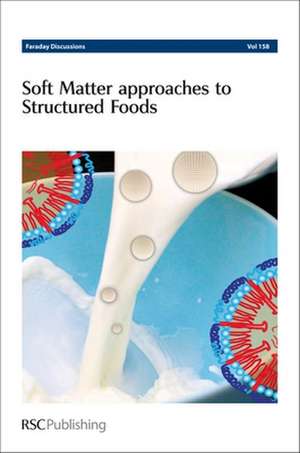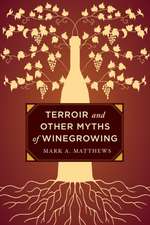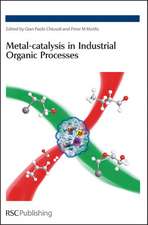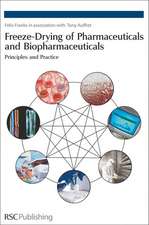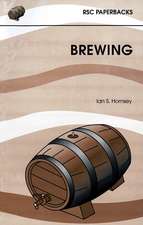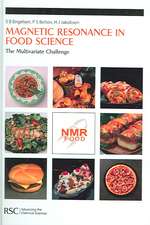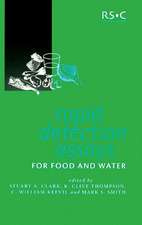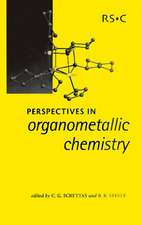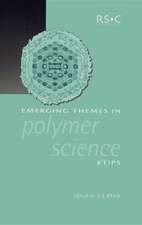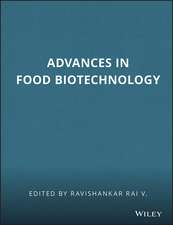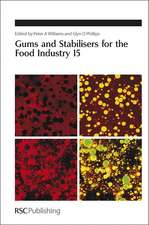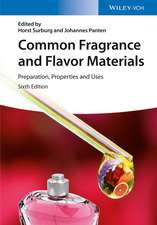Soft Matter Approaches to Structured Foods: Faraday Discussions No 158: Faraday Discussions, cartea 158
Autor Royal Society of Chemistryen Limba Engleză Hardback – 30 oct 2012
Food materials are unusual as soft matter. They are highly complex, operating on multiple length scales and phases and structured via multiple externally applied fields. A growing number of scientists are applying a soft matter physics approach to food science. This Faraday Discussion on Soft Matter Approaches to Structured Food will introduce and strengthen the concept of the soft matter approach to food scientists, and bring food scientists together with non-food experts (both experimental and theoretical) from the field of soft matter physics. The Discussion will allow for the exchange of views on state-of-the-art approaches like soft-glass rheology, multiscale/mesoscale simulation techniques, theories on slow dynamics, and driven soft matter systems. The Discussion will be held in the city of Wageningen in the Netherlands - one of the prime centres for food science in Europe. The Scientific Committee warmly invites you to take part in the Discussion and looks forward to welcoming you in Wageningen.
Din seria Faraday Discussions
- 14%
 Preț: 1311.83 lei
Preț: 1311.83 lei - 14%
 Preț: 1323.05 lei
Preț: 1323.05 lei - 14%
 Preț: 1321.37 lei
Preț: 1321.37 lei - 14%
 Preț: 1323.05 lei
Preț: 1323.05 lei - 14%
 Preț: 1321.37 lei
Preț: 1321.37 lei - 14%
 Preț: 1319.72 lei
Preț: 1319.72 lei - 14%
 Preț: 1316.41 lei
Preț: 1316.41 lei - 14%
 Preț: 1305.19 lei
Preț: 1305.19 lei - 14%
 Preț: 1306.87 lei
Preț: 1306.87 lei - 14%
 Preț: 1314.30 lei
Preț: 1314.30 lei - 14%
 Preț: 1308.50 lei
Preț: 1308.50 lei - 14%
 Preț: 1328.01 lei
Preț: 1328.01 lei - 14%
 Preț: 1301.86 lei
Preț: 1301.86 lei - 9%
 Preț: 1179.23 lei
Preț: 1179.23 lei - 9%
 Preț: 1180.17 lei
Preț: 1180.17 lei - 14%
 Preț: 1329.65 lei
Preț: 1329.65 lei - 14%
 Preț: 1310.15 lei
Preț: 1310.15 lei - 14%
 Preț: 1321.37 lei
Preț: 1321.37 lei - 9%
 Preț: 1180.66 lei
Preț: 1180.66 lei - 14%
 Preț: 1318.04 lei
Preț: 1318.04 lei - 14%
 Preț: 1328.01 lei
Preț: 1328.01 lei - 14%
 Preț: 1324.68 lei
Preț: 1324.68 lei - 14%
 Preț: 1290.29 lei
Preț: 1290.29 lei - 14%
 Preț: 1326.33 lei
Preț: 1326.33 lei - 14%
 Preț: 1332.98 lei
Preț: 1332.98 lei - 14%
 Preț: 1316.41 lei
Preț: 1316.41 lei - 14%
 Preț: 1306.02 lei
Preț: 1306.02 lei - 14%
 Preț: 1326.33 lei
Preț: 1326.33 lei - 14%
 Preț: 1310.15 lei
Preț: 1310.15 lei - 14%
 Preț: 1604.94 lei
Preț: 1604.94 lei - 14%
 Preț: 1237.50 lei
Preț: 1237.50 lei - 14%
 Preț: 1232.50 lei
Preț: 1232.50 lei - 14%
 Preț: 1241.29 lei
Preț: 1241.29 lei - 14%
 Preț: 1241.29 lei
Preț: 1241.29 lei - 14%
 Preț: 1241.29 lei
Preț: 1241.29 lei - 14%
 Preț: 1278.64 lei
Preț: 1278.64 lei - 14%
 Preț: 1288.89 lei
Preț: 1288.89 lei - 14%
 Preț: 1277.65 lei
Preț: 1277.65 lei - 14%
 Preț: 1285.76 lei
Preț: 1285.76 lei - 14%
 Preț: 1279.49 lei
Preț: 1279.49 lei - 14%
 Preț: 1287.25 lei
Preț: 1287.25 lei - 14%
 Preț: 1451.41 lei
Preț: 1451.41 lei - 14%
 Preț: 1291.06 lei
Preț: 1291.06 lei - 14%
 Preț: 1328.01 lei
Preț: 1328.01 lei - 14%
 Preț: 1321.37 lei
Preț: 1321.37 lei - 14%
 Preț: 1318.04 lei
Preț: 1318.04 lei - 14%
 Preț: 1316.41 lei
Preț: 1316.41 lei - 14%
 Preț: 1309.80 lei
Preț: 1309.80 lei - 14%
 Preț: 1318.04 lei
Preț: 1318.04 lei
Preț: 1242.60 lei
Preț vechi: 1444.88 lei
-14% Nou
Puncte Express: 1864
Preț estimativ în valută:
237.80€ • 258.22$ • 199.75£
237.80€ • 258.22$ • 199.75£
Carte disponibilă
Livrare economică 02-16 aprilie
Preluare comenzi: 021 569.72.76
Specificații
ISBN-13: 9781849734493
ISBN-10: 1849734496
Pagini: 540
Dimensiuni: 163 x 236 x 34 mm
Greutate: 0.97 kg
Editura: Royal Society Of Chemistry
Seria Faraday Discussions
ISBN-10: 1849734496
Pagini: 540
Dimensiuni: 163 x 236 x 34 mm
Greutate: 0.97 kg
Editura: Royal Society Of Chemistry
Seria Faraday Discussions
Notă biografică
Faraday Discussions documents a long-established series of Faraday Discussion meetings which provide a unique international forum for the exchange of views and newly acquired results in developing areas of physical chemistry, biophysical chemistry and chemical physics. The papers presented are published in the Faraday Discussion volume together with a record of the discussion contributions made at the meeting. Faraday Discussions therefore provide an important record of current international knowledge and views in the field concerned. The latest (2010) impact factor of Faraday Discussions is 4.5
Cuprins
Introductory Lecture: Soft matter approaches to structured foods: from "cook-and-look" to rational food design?; Designing colloidal structures for micro and macro nutrient content and release in foods; Protein cluster formation during enzymatic cross-linking of globular proteins; Anomalies in moisture transport during broccoli drying monitored by MRI?; Structural changes of deposited casein micelles induced by membrane filtration; Model for particle migration in bidisperse suspensions by use of effective temperature; General discussion; Stability of aqueous food grade fibrillar systems against pH change; Quinoa starch granules as stabilizing particles for production of Pickering emulsions; Soy milk oleosome behaviour at the air-water interface; Critical laminar shear-temperature effects on the nano- and mesoscale structure of a model fat and its relationship to oil binding and rheological properties; Surface shear rheology of hydrophobin adsorption layers: laws of viscoelastic behaviour with applications to long-term foam stability; Elucidation of density profile of self-assembled sitosterol + oryzanol tubules with small-angle neutron scattering; General Discussion; New Routes to food gels and glasses; Protein structure and interactions in the solid state studied by small-angle neutron scattering; The role of quench rate in colloidal gels; Delayed solidifcationof soft glasses: new experiments, and a theoretical challenge; Slow dynamics and structure in jammed milk protein suspensions; Arrested coalescence of viscoelastic droplets with internal microsctructure; General discussion; Viscoelastic phase seperation in soft matter and foods; Kinetic model for the mechanical response of suspensions of sponge-like particles; Nanoscale characteristics of triacylglycerol oils: phase separation and binding energies of two-component oils to crystalline nanoplatelets; Soft matter approaches as enablers for food macroscale simulation; Numerical study of the effect of thiol-disulfide exchange in the cluster phase of beta-lactoglobulin aggregation; A multiscale approach to triglycerides simulations: from atomistic to coarse-grained models and back; General discussion; Concluidng remarks: the future of soft matter and food strucure; Additional information; Poster titles; List of Participants; Index of contributors
Descriere
Food materials are unusual as soft matter. They are highly complex, operating on multiple length scales and phases, and structured via multiple externally applied fields. A growing number of scientists are applying a soft matter physics approach to food science as shown in this text.
